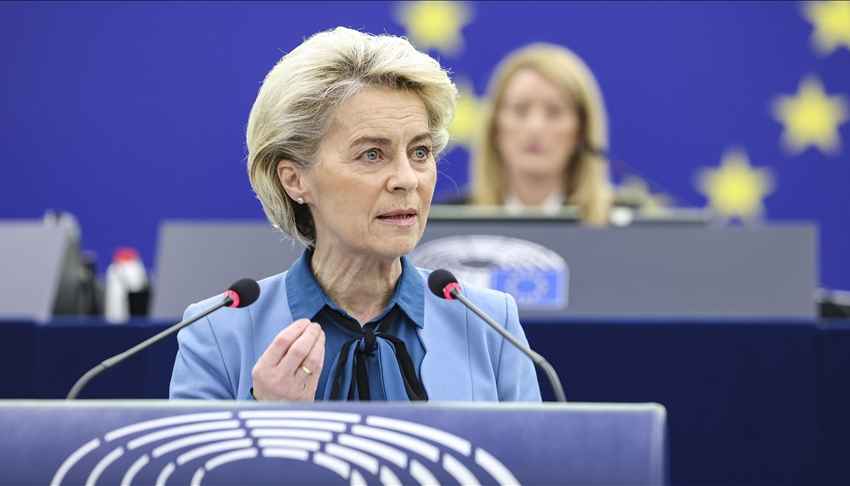
Following the suspension of Russian gas supplies to Poland and Bulgaria, EU Commission President Ursula von der Leyen has accused Moscow of blackmail. But she said the EU was prepared for this scenario and would “provide a collective response”.
They are in close contact with all EU states and have been working to secure supplies from other countries, she said before adding, there are contingency plans for such a situation.
Polish and bulgarian supply secured for now
Poland’s head of government Mateusz Morawiecki called the supply freeze a “direct attack” on his country. “This time Russia has pushed the limit of imperialism, gas imperialism, one step further” Morawiecki told parliament in Warsaw. He said Russia’s move was intended as revenge for Poland imposing sanctions on a number of oligarchs and companies, including state-owned Gazprom.
The head of government went on to say that Poland has enough gas reserves. Energy supplies are secure, he said. “We have been pumping gas into Polish storage facilities in recent months and not into Russian-owned storage facilities in Germany”.
Bulgaria also accused Russia of misusing natural gas as a political and economic weapon.
Bulgaria depends almost entirely on Russian natural gas supplies. According to Energy Minister Aleksandar Nikolov, the country’s gas supply is secured for at least one month. A connection to the gas network of neighboring Greece should be ready in June.
Bulgaria was supposed to stop receiving natural gas from Russia as of Wednesday, but the supply continued, according to the energy minister in the morning. It is expected to be cut off later in the day.
Poland and Bulgaria continue to be transit countries
Russia had stopped supplies to Poland through the Yamal pipeline in the morning as announced, according to Climate Minister Anna Moskva. However, there were no reports of supply disruptions in the country. According to the minister, the relatively well-filled gas storage facilities would not have to be tapped at present; this could become more of an issue in the next fall and winter season. By then, however, a new pipeline is also to carry Norwegian gas to Poland via the Baltic Sea. Poland wanted to let the supply contracts with Russia expire then anyway.
Warsaw considered Russia’s suspension of supplies to be a breach of contract. Gazprom had justified the step by saying that Poland and Bulgaria had not made any payments in rubles. Russian President Vladimir Putin had announced last month that Russia would only accept payments for gas deliveries in its national currency.
Gazprom also warned Poland and Bulgaria this morning not to tap Russian gas delivered to other countries through their territory. In this case, the gas volumes delivered to Europe would be reduced, the group said.
The Polish government had confirmed this week that it would supply the Ukrainian army with tanks. The country is also an important transit state for arms deliveries from the US and other Western countries to Ukraine.
What is the EU doing ?
Since the beginning of the war the EU felt the pressure of past mistakes. The Commission is now actively seeking an import ban on Russian gas and oil. So far, however, there is not the necessary consensus among the EU states. In addition to Germany and Austria, Hungary also recently spoke out against a gas embargo.
EU member states reached a consensus on Friday, March 25, to mandate the European Commission to carry out combined gas purchases, modeled on the Covid vaccine orders. The Commission “will, as a matter of urgency, work together on voluntary purchases of gas, liquefied natural gas (LNG) and hydrogen” taking advantage of the EU’s economic weight to benefit from better prices, according to the conclusions of the Brussels summit.
“Combined purchasing, the ability to define long contracts together, is the best instrument to bring prices down”, argued French President Emmanuel Macron at a press conference.
Seeking to isolate Moscow and deprive Russia of income after its invasion of Ukraine, Brussels wants to reduce by two-thirds this year the European purchases of Russian gas. By grouping requests, the Commission also intends to facilitate contacts with international suppliers in order to diversify the sources of supply for Europeans. The European Commission has begun negotiating with the main producing countries (Norway, Qatar, Algeria) and announced on Friday an agreement with the United States to increase their deliveries of liquefied natural gas to the EU.
The EU’s combined purchasing platform “will also be open to the countries of the Western Balkans”, as well as the three states linked to the EU by association agreements (Moldova, Ukraine, Georgia), are stating the summits conclusions.
By The European Institute for International Law and International Relations.














